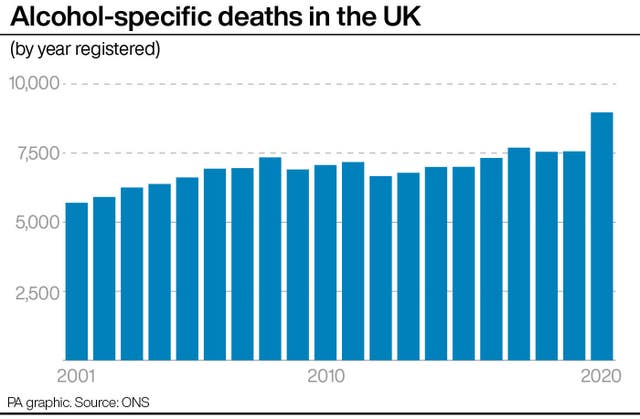Alcohol deaths in UK hit new high after record increase
It is too early to know if the rise can be linked to the Covid-19 lockdowns.

Deaths in the UK caused directly by alcohol hit a new high in 2020 after the biggest year-on-year increase since records began, figures show.
A total of 8,974 deaths related to alcohol-specific causes were registered in the UK last year, or 14.0 deaths per 100,000 people.
This is up 18.6% on the 7,565 deaths registered in 2019, or 11.8 per 100,000.
The rise was described as “statistically significant” by the Office for National Statistics (ONS), which published the figures.

There will be “many factors” behind the increase and “it may be some time before we fully understand all of these”, the ONS said.
The figures were described as “tragic” by Matt Lambert, chief executive officer of the Portman Group, the social responsibility and regulatory body for alcohol in the UK.
“The reasons for this increase in deaths are complex,” Mr Lambert said. “It may be that the pressures on people and services caused by the pandemic have exacerbated problems for those needing help. It is highly welcome that the Government has committed to a sizeable increase in funding that will support treatment for those drinking alcohol to harmful levels.”
David Fothergill, chairman of the Local Government Association’s Community Wellbeing Board, said: “These stark statistics should act as a wake-up call about the impact of Covid-19 on our general health, including for those with alcohol-related conditions, such as reaching out to people who have not yet been in treatment.
“Councils, which are responsible for public health services, are committed to continue supporting everyone with alcohol and other substance misuse problems, despite ongoing pressures made worse by the pandemic.”
Separate data from the Office for Health Improvement and Disparities has suggested levels of alcohol consumption in England have changed since the start of the Covid-19 pandemic, with periods of lockdown coinciding with a slight rise in the proportion of people drinking a high number of units of alcohol each week.
Comparable data for alcohol-specific deaths in the UK begins in 2001, and shows rates of death remained stable between 2012 and 2019.
All four UK nations saw a rise in 2020, though only England and Scotland recorded “significant” increases, according to the ONS.
Scotland had the highest rate of alcohol-specific deaths last year (21.5 per 100,000 people, up from 18.6), followed by Northern Ireland (19.6, up from 18.8), Wales (13.9, up from 11.8) and England (13.0, up from 10.9).
As in previous years, the rate for males across the UK was more than double the rate for females (19.0 and 9.2 respectively).
Alcohol-specific deaths only include those health conditions where death is a direct consequence of alcohol misuse.
More than three-quarters of these deaths in 2020 were caused by alcoholic liver disease (77.8%).
A further 12.1% of deaths were caused by “mental and behavioural disorders due to the use of alcohol”, while “external causes”, such as accidental poisoning by alcohol, caused 6.2%.
The figures also show that in the most deprived areas of England the alcohol-specific rate of death for males in 2020 stood at 33.7 per 100,000 people, compared with just 8.1 in the least deprived areas.
For females the figures were 14.9 and 4.9 respectively.
Across the regions of England, six out of nine saw a statistically significant increase in rates from 2019 to 2020: north-east England (from 16.6 deaths per 100,000 to 20.0 – the highest rate for any region); north-west England (14.4 to 17.2); the West Midlands (12.1 to 16.1); south-west England (8.7 to 11.5); south-east England (9.2 to 10.9); and London (7.9 to 9.9).
The other three regions are Yorkshire and the Humber (up from 13.9 to 15.3); the East Midlands (11.1 to 12.9) and eastern England (8.9 to 9.2).





